The transition of sports stars to the silver screen has been a consistent trend for decades. And, in many cases, the trend has been both critically and commercially successful (see: Vinnie Jones in Lock, Stock and Two Smoking Barrels and Snatch). However, there have been a number of unfortunate vehicles for several sports heroes that have made them both an embarrassment to their sport and the film industry itself. What follows are the six most blatant blunders.
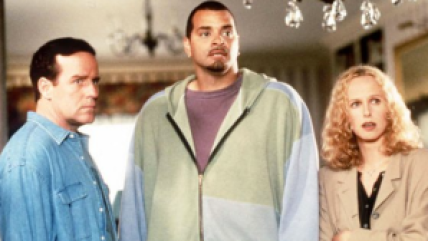
Houseguest with Sinbad: In one of those absurd plots that could only exist in a 90s movie, Sinbad plays a character in trouble for his debt to the mob. Overhearing a conversation at the Pittsburgh International Airport between suburbanites Gary Young (Phil Hartman) and his wife, Emily (Kim Greist), Sinbad sees an opportunity to hide with them when he hears that Gary is waiting for a childhood friend he no longer recognizes as they haven’t seen each other in 25 years (though this still doesn’t help so much with the plausibility of the narrative). Sinbad, of course, ends up changing the Young family’s life for the better, so that when they find out he’s an impostor, they don’t really seem to mind. Why Phil Hartman agreed to do this movie, no one will ever know.
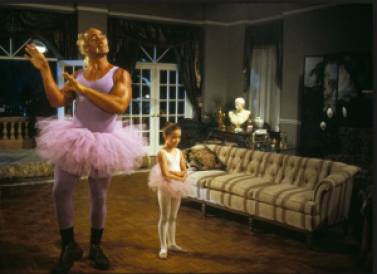
Mr. Nanny with Hulk Hogan: Originally called Rough Stuff (which was likely changed for how gross and pedophilic it sounded), Mr. Nanny doesn’t stray too far from reality in terms of back story. Hulk Hogan plays Sean Armstrong, a former wrestler who gets talked into guarding–a.k.a. babysitting–by his ex-manager, who now owns his own bodyguard company. Not expecting the antics of the children he’s assigned to, Kate (Madeline Zima) and Alex Mason Jr. (Robert Hy Gorman), Sean is initially a victim of their tomfoolery. Sean has been implemented to protect them because of the threat to their father, Alex Sr. (Austin Pendleton), who has manufactured a microchip containing the plans for an anti-missile system. Pairing the plot of terrorism and technology with an ex-wrestler in a tutu was, obviously, not going to be a prosperous venture. But it was 1993, and studios were more lenient back then.
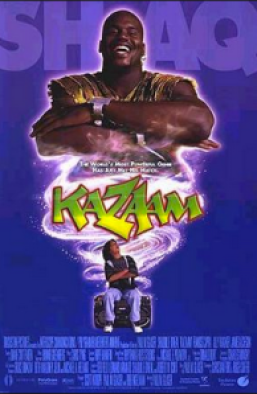
Kazaam with Shaq: In what universe someone thought it would be a good idea to have Shaq star as a genie is unclear. Nonetheless, Kazaam came out in 1996, and told the whimsical tale of a five thousand year old genie who appears from a magical boom box to grant three wishes. Of course, Kazaam didn’t always live in a boom box. His magical lamp was knocked over by a giant wrecking ball (pre-Miley), sending his spirit into the nearby boom box. The boy who finds this magical boom box is Max (Francis Capra), a bullied, beleaguered student with problems at home. In between granting Max his wishes, Kazaam also finds time to get a record deal and make slam dunks out of people he turns into basketballs. It’s, thus, no small wonder that Kazaam barely made back its twenty million dollar budget.
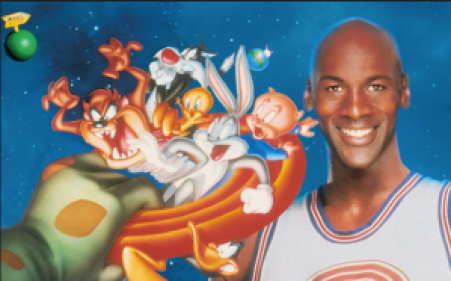
Space Jam with Michael Jordan: Also released in 1996 (apparently an epic year for sports stars to movie stars transitions), Space Jam reflects Michael Jordan’s retirement from basketball and his ultimate return after a failed baseball career. But instead of a rational account of this, we’re given one in which Jordan is plucked from retirement by the Looney Tunes, who need his help to defeat a rival basketball team called the Monstars. The Monstars were at first called the Nerdlucks, but then stole the talent of five major league NBA players to ensure they would win their game against the Looney Tunes. The stakes of the game involve forcing the Looney Tunes to work at a fledgling amusement park run by the Nerdlucks’ boss, Swackhammer (voiced by Danny DeVito), called Moron Mountain. While Space Jam may have been a box office success–with a soundtrack that people were obsessed with–there can be no denying its badness.
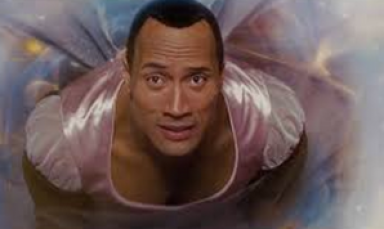
Tooth Fairy with The Rock: Another hit in terms of financial return, Tooth Fairy finds hockey player Derek Thompson (The Rock, or Dwayne Johnson) forced into becoming a tooth fairy after he tells his daughter’s girlfriend (played by Ashley Judd–the girlfriend, not the daughter) that the tooth fairy isn’t real. And this is all because he stole a dollar from her when she was expecting money from her lost tooth. This infuriates the tooth fairy community, and, as punishment, Derek must serve two weeks as a tooth fairy in order to improve his relationship with children and fostering dreams. Apart from Stephen Merchant as Tracy, the caseworker who must help Derek with his training, there is very little redeeming about this movie.



















